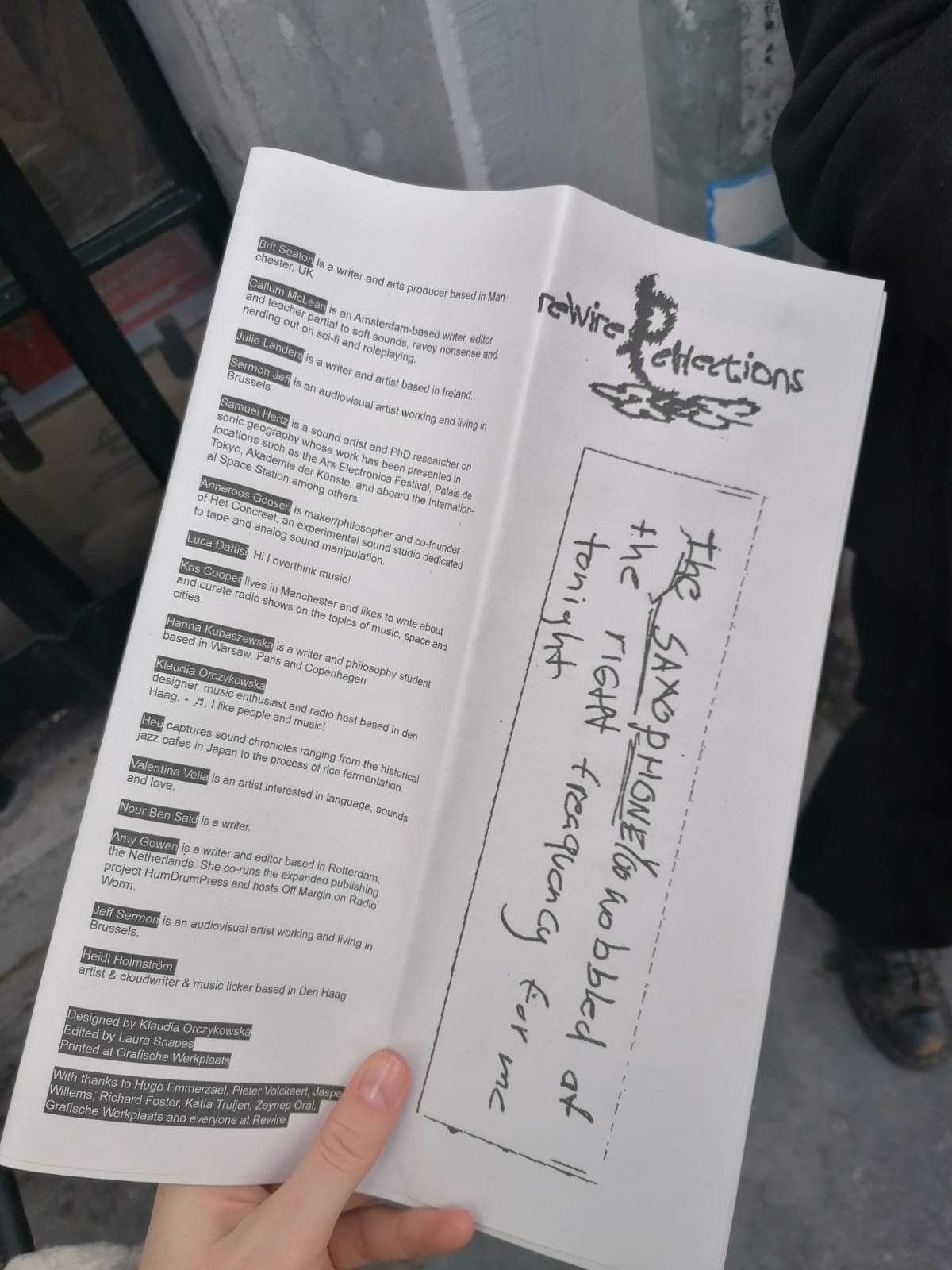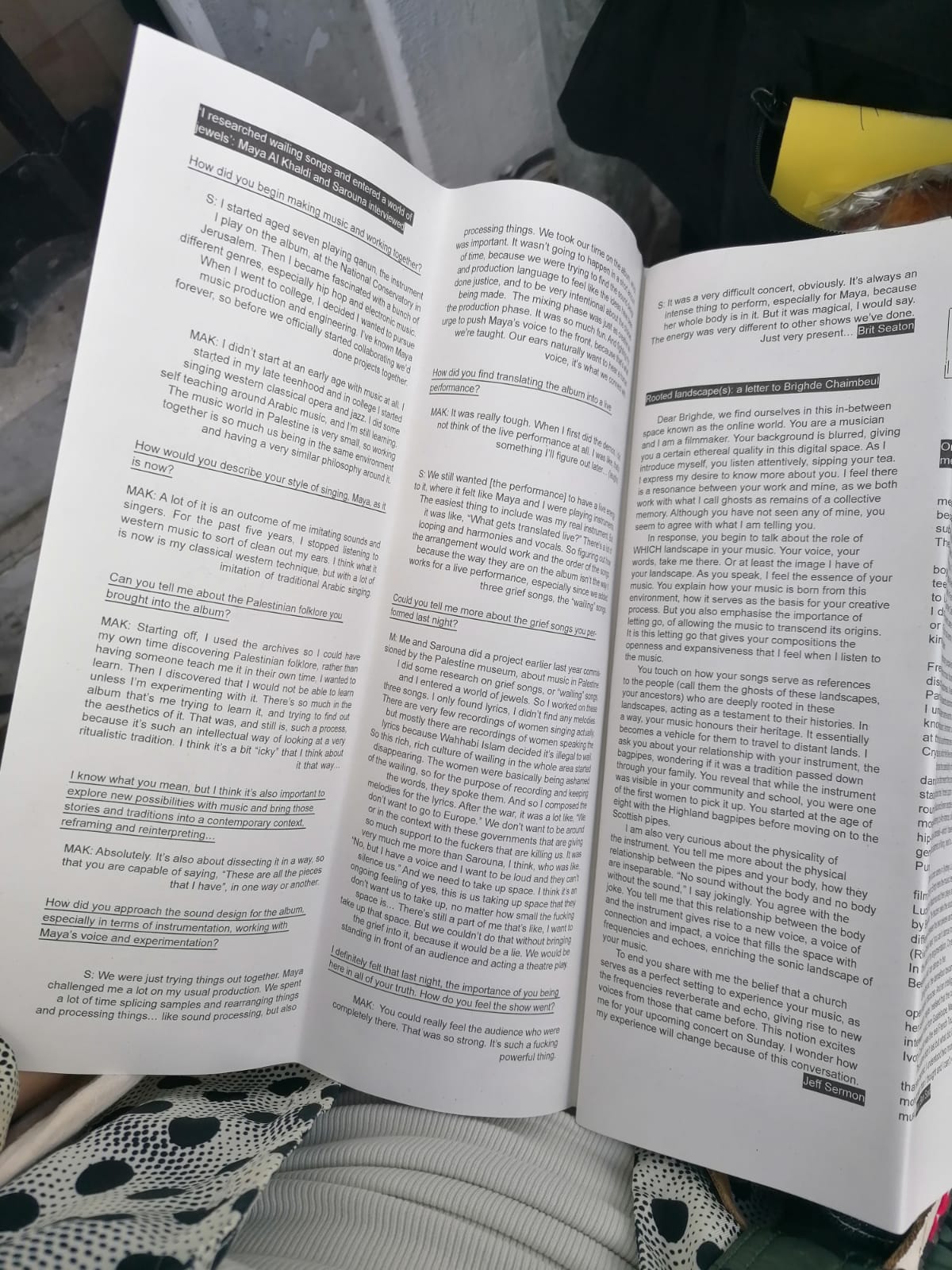Rewire Reflections
Writer (2024)
As part of Rewire’s Context Programme, music writers and researchers took part in an intensive writing workshop led by Laura Snapes (music journalist and deputy music editor at The Guardian). We created a zine that was launched on the last day of the festival.
I had the honor and privilege of interviewing Palestinian artists Maya Al-Khaldi and Sarouna following their performance on the Friday night, presenting material from their album ‘Other World’ alongside traditional Palestinian grief songs.
Writer (2024)
As part of Rewire’s Context Programme, music writers and researchers took part in an intensive writing workshop led by Laura Snapes (music journalist and deputy music editor at The Guardian). We created a zine that was launched on the last day of the festival.
I had the honor and privilege of interviewing Palestinian artists Maya Al-Khaldi and Sarouna following their performance on the Friday night, presenting material from their album ‘Other World’ alongside traditional Palestinian grief songs.


Maya Al Khaldi and Sarouna reflect on their sonic origins and inspirations, and channelling the album ‘Other World’ into a performance illuminating tradition, grief and truth.
How did you begin making music and working together?
Sarouna: I started aged seven playing qanun, the instrument I play on the album, at the National Conservatory in Jerusalem. Then I became fascinated with a bunch of different genres, especially hip hop and electronic music. When I went to college, I decided I wanted to pursue music production and engineering. I've known Maya forever, so before we officially started collaborating we'd done projects together.
Maya: I didn't start at an early age with music at all. I started in my late teenhood and in college I started singing western classical opera and jazz. I did some self teaching around Arabic music, and I'm still learning. The music world in Palestine is very small, so working together is so much us being in the same environment and having a very similar philosophy around it.
How would you describe your style of singing, Maya, as it is now?
M: A lot of it is an outcome of me imitating sounds and singers. For the past five years, I stopped listening to western music to sort of clean out my ears. I think what it is now is my classical western technique, but with a lot of imitation of traditional Arabic singing.
Can you tell me about the Palestinian folklore you brought into the album?
M: Starting off, I used the archives so I could have my own time discovering Palestinian folklore, rather than having someone teach me it in their own time. I wanted to learn. Then I discovered that I would not be able to learn unless I'm experimenting with it. There's so much in the album that's me trying to learn it, and trying to find out the aesthetics of it. That was, and still is, such a process, because it's such an intellectual way of looking at a very ritualistic tradition. I think it’s a bit ‘icky’ that I think about it that way…
I know what you mean, but I think it’s also important to explore new possibilities with music and bring those stories and traditions into a contemporary context, reframing and reinterpreting…
M: Absolutely. It's also about dissecting it in a way, so that you are capable of saying, ‘These are all the pieces that I have,’ in one way or another.
How did you approach the sound design for the album, especially in terms of instrumentation, working with Maya’s voice and experimentation?
S: We were just trying things out together. Maya challenged me a lot on my usual production. We spent a lot of time splicing samples and rearranging things and processing things… like sound processing, but also ‘processing’ things. We took our time on the album, which was important. It wasn't going to happen in a short amount of time, because we were trying to find the sound design and production language to feel like the ideas have been done justice, and to be very intentional about the choices being made.
The mixing phase was just as creative as the production phase. It was so much fun. And fighting my urge to push Maya’s voice to the front, because that's what we're taught. Our ears naturally want to hear a human voice, it's what we connect with.
How did you find translating the album into a live performance?
M: It was really tough. When I first did the demos, I did not think of the live performance at all. I was like, that’s something I’ll figure out later…
S: We still wanted [the performance] to have a live energy to it, where it felt like Maya and I were playing instruments. The easiest thing to include was my real instrument. But it was like, ‘What gets translated live?’ There's a lot of looping and harmonies and vocals. So figuring out how the arrangement would work and the order of the songs, because the way they are on the album isn't the way it works for a live performance, especially since we added three grief songs, the ‘wailing’ songs.
Could you tell me more about the grief songs you performed last night?
M: Me and Sarouna did a project earlier last year commissioned by the Palestine Museum, about music in Palestine. I did some research on grief songs, or ‘wailing’ songs, and I entered a world of jewels. So I worked on these three songs. I only found lyrics, I didn’t find any melodies. There are very few recordings of women singing actually, but mostly there are recordings of women speaking the lyrics because Wahhabi Islam decided it's illegal to wail. So this rich, rich culture of wailing in the whole area started disappearing. The women were basically being ashamed of the wailing, so for the purpose of recording and keeping the words, they spoke them. And so I composed the melodies for the lyrics.
After the war, it was a lot like, ‘We don't want to go to Europe.’ We don't want to be around or in the context with these governments that are giving so much support to the fuckers that are killing us. It was very much me more than Sarouna, I think, who was like, ‘No, but I have a voice’ and I want to be loud and they can't silence us. And we need to take up space. I think it's an ongoing feeling of yes, this is us taking up space that they don't want us to take up, no matter how small the fucking space is… There's still a part of me that's like, I want to take up that space. But we couldn't do that without bringing the grief into it, because it would be a lie. We would be standing in front of an audience and acting a theatre play.
I definitely felt that last night, the importance of you being here in all of your truth. How do you feel the show went?
M: You could really feel the audience who were completely there. That was so strong. It's such a fucking powerful thing.
S: It was a very difficult concert, obviously. It’s always an intense thing to perform, especially for Maya, because her whole body is in it. But it was magical, I would say. The energy was very different to other shows we’ve done. Just very present…